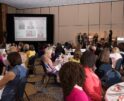
Pamela Moret – VP, Strategic Development, Thrivent Financial

This top woman exec says she got there by taking on roles she never dreamed she’d hold – and never looking back.
By Taylor Mallory
Climbing a lattice (as opposed the typical career ladder) may be more challenging, but it can also be more fun – and more effective when it comes to career success, says Pamela J. Moret, a lawyer turned American Express (AMEX) public affairs head, turned executive vice president of strategic development for Thrivent Financial.
“Taking on all those stretch roles in areas where I wasn’t classically trained or experienced was a fantastic experience. It kept my adrenaline going,” says Moret, who also served as senior vice president of AMEX Financial Advisors with P&L responsibility in 14 lines of business. “One mistake women make is assuming careers are vertical ladder when they’re really lattices.”
This isn’t a philosophy she discovered purposefully. “I didn’t know I was adopting a lattice approach. I was just feeding my appetite for personal growth and development. In one case, I took a demotion in order to do something else. It was worth it. I became broader and smarter and gained new perspectives and skills,” she explains. “It’s like a large learning jungle gym. You have to climb around a while to figure it out, where you like to be, who you like to play with and how you get back up when you fall. You just have to go out there and do it.”
Here, she talks to PINK about risking taking, success secrets – and how Thrivent made PINK’s 2009 list of Top Companies for Women in Business.
PINK: What does it take to be successful in a stretch role?
Pamela Moret: Confidence in your ability to learn and figure it out – and
willingness to put in the hard work to do it. It’s not going to be easy for a while as you roll up your sleeves and do it. Once you take a new job in a new field, for the first six to 12 months, you have a day and night job. Your day job is doing it and your night job is getting ready to do it tomorrow so you don’t look like an idiot. (Laughs) You have to work hard to get the knowledge base quickly. Ask yourself, “Who am I going to talk to? What will I read? What exposure do I need? What areas do I feel most uneasy about, and where can I get help in those areas?” I create a “map” answering all these questions before I start the job. It’s a purposeful way to go in. It helps you stay on task and gives you more confidence.
PINK: Do you make big mistakes when you take on new roles?
P.M.: Sure, and the more senior the role, the more visible the mistakes are. But they don’t necessarily end your career. I made a glaring mistake in my public affairs role at American Express. There was a major M&A announcement I was supposed to run by a particular department. I’d mapped out everything else perfectly but just didn’t have enough experience to know I was supposed to do this before the announcement. The people I was working with assumed I knew. And the CEO was (rightfully) very unhappy. I recovered by owning it, realizing I had learned the hard way and deciding I was going to dive in and learn enough to never let it happen again. Everyone makes mistakes. You can feel bad enough about it not to do it again, but don’t self-flagellate forever.
PINK: Why is risk-taking important for women?
P.M.: Women often come packaged with more risk aversion than men. Whatever the reasons, you have to proactively become aware of it. Name it and figure out when it serves you. Sometimes risk aversion can be good and help you avoid problems. It’s only bad if you don’t let yourself ever take risks. Watching for risks should be used thoughtfully, not relied on. Find your own sweet spot. When do you shy away from risks? When do you take them? Why? Where could you be taking more risks in areas where you would benefit most? If you just play it safe all the time, not much will every happen for you. I saw a statistic recently that said half of all jobs today didn’t exist 30 years ago. So the job you got trained for in college might not even exist later or maybe it will be something you dislike later in your career. The world changes so rapidly, and risk is part of change – which makes things better more often than it makes them worse. At Thrivent Financial, we adhere to the 70/20/10 theory of personal development – that 10 percent of learning comes from studying and taking classes, 20 percent from feedback and coaching and 70 percent from actually doing things – which usually involves risk. Women often do the reverse of that – and it slows their growth and development.
PINK: You’re responsible for new business development? What are some creative ways you’re bringing in business during these tough economic times?
P.M.: We’ve made a decision as a firm that, in good or bad times, we’ll always be investing in our future. The economy will eventually get better, so we have to execute well on our core business right now but never take time off from preparing for future, so we’re being frugal but still taking risks. We devote a chunk of our resources to exploring new businesses – things that are close to our existing business and less related areas that involve more risk but could become substantial in 10 years. Right now, for instance, we’re looking into the aging field. We’re looking at where we can improve that experience for our customers. It’s taking us in some entirely new directions.
PINK: What’s your best business advice?
P.M.: Take ownership for you own career. Too many people wait for someone else to help them plot their course. That’s not how it works. You have to drive your own bus. Thrivent Financial has program called Career GPS to help people own their careers. You don’t start work one day and 20 years later become CEO. You have to shape, manage and grow your own career along the way.
PINK: What’s Thrivent’s secret to making it on PINK’s Top Companies for Women list this year?
P.M.: Attracting and retaining women is something the organization has been interested in for a long time. After a merger that formed Thrivent seven years ago, our CEO made an overt commitment to be a place where women would love to work – with a brilliant two-tier strategy. In a top-down way, he hired a group of women at senior levels to help him pave the way. I was one of the first ones, but we now have a large representation of women on our executive management team, including some in non-traditional jobs for women. He also instituted programs to create a culture women would want to be part of – like our active mentoring program, our GPS career development program and flex-time policies.
PINK: What’s your leadership style?
P.M.: I am a strong extrovert. I love being with people in a challenging, active environment. I’m a driver, so I really want to always be making myself and others better – and projects more successful. I have high expectations of myself and others. And I’m quite direct, which is hard for some people to get used to, particularly in the upper-Midwest, where everyone is really polite. I grew up in North Dakota, but people sometimes accuse me of growing up in New York. (Laughs). I care deeply about people. I’m an active volunteer. And I want to encourage the people I work with to have lives. The best way to have good working relationships with your team is to recognize them as people – not just cogs in a machine.
PINK: How do you manage your Life/Work balance?
P.M.: My children are now ages 25, 23 and 20. Balance is always evolving, but it’s always been challenging. I’m married to a fabulous guy, a physician, who has been a tremendously good sport about all my time-consuming career moves. Early on, I realized that it was never going to be perfect, but it could be really good. It takes a tremendous amount of work. There were periods of my life where I definitely wasn’t getting enough sleep – up all night with one kid with an ear infection and another throwing up, knowing I had a big meeting in the morning. During that, you sometimes wonder what you were thinking when you decided to do all of this. But in the light of day, it always works out – and I wouldn’t change a thing. You get creative. When my kids were little, power hour (when everyone was getting home at the end of the day) was dreadful – kids wanting to talk about their days, dog wanting to go out, phone ringing, and me being exhausted after a long day. So it became my goal to make that good. We decided traditional dinner didn’t matter anymore. I gave up the idea of Leave it to Beaver dinners hot out of the crock pot, and we had kitchen picnics on the floor as soon as we all came in, sometimes still in work clothes. We just needed a time to come together and decompress, and nothing else mattered more.
PINK: Who inspires you most?
P.M.: My parents, especially my dad. In a time where it was pretty uncharacteristic for women to do some of the things I was doing even as a kid, it was beat into me that girls could do whatever they wanted and never to let anyone tell me differently. I only had cheerleaders in my parents. While those messages often came from Mom, too, they need to be reinforced by Dad, and my parents were very vocal about it. Whether it was athletics or education or some funky language I wanted to learn, he told me to do it and to, “Feel free to do it well.” I was odd growing up. I was a straight-A athlete in a place where the popular girls were B-minus cheerleaders. North Dakota isn’t exactly thought of as the intellectual capital of the world, but is a wonderful place. But I learned so many important things about work ethic, people, support and family stability.
PINK: What do you want to that you haven’t yet?
P.M.: I’m 53-years-old and don’t know when I’ll retire, but I can see it from here, where I couldn’t five years ago. I don’t know what I should do in retirement. I know I won’t sit around but I haven’t figured out what my act two will be yet. It’s still a fun puzzle. And I would really like to serve on some for-profit company boards. I did that once before, and it was a marvelous, stimulating experience.
PINK: How do you define “success”?
P.M.: Having a visible impact on whatever I’m doing – whether it’s raising my three kids or serving on a committee at church or doing a project at work. My dad always said that if you aren’t seeing footsteps behind you, you aren’t working hard enough to have the impact you should have in life.
Recommended
-
Do You Have The Imposter Syndr...June 18th, 2022
-
1 Key Email Marketing Tips For...January 6th, 2022
-
Six Tips For Choosing A PEO Se...September 20th, 2021
-
Top Women Profiles, PINK Lists...July 20th, 2021
-
Black Lives Matter. PINK Stand...June 15th, 2020















